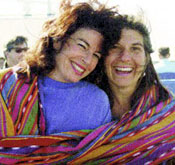 'Lost and Found Sound' 'Lost and Found Sound'
Davia Nelson (left) and Nikki Silva, aka the Kitchen Sisters, have brought
recordings from the last century to life.
Photo: Laura Folger
Davia Nelson (B.A., politics, Stevenson '75) and Nikki Silva (B.A., aesthetic studies, Porter '73) produce a historic series for National Public Radio
Thomas Edison cracking jokes. Tennessee Williams making recordings at
a penny arcade. The whir, whistle, and hum of electric fans. Carnival
talkers. Vietnamese manicurists. Voices of long-lost sisters, fathers, and
grandfathers. Answering-machine monologues.
These are just a few of the sounds and subjects Davia Nelson and Nikki
Silva have brought to life for millions of radio listeners nationwide on Lost & Found Sound.
Launched two years ago, the award-winning series will air on National Public
Radio's popular program All Things Considered through 2001.
Lost & Found Sound weaves together archival recordings, interviews, and music with journalistic storytelling
to chronicle how recorded sound shaped and captured the 20th century. Much
of the material for the series comes from the listeners themselves, who
have scoured their attics, basements, and garages for personal recordings
of historic events, audio letters, and other sonic artifacts.
"The ability to record sound is just over 100 years old," says
Silva, who has coproduced radio projects with Nelson for two decades. "There
was a written record prior to 1900 and an oral tradition before that, but the 20th century was the first that was completely documented
through the medium of recorded sound."
Lost & Found Sound got its start with Nelson, who, learning
of a project commemorating the last century in photographs, realized
the same could–and should–be done in sound.
After approaching award-winning radio producer Jay Allison and discussing
the project with friends and colleagues from across the country, Nelson
and Silva proposed the series to the National Public Radio (NPR) network.
With NPR's support, the project mushroomed into a national collaboration,
involving radio producers, public radio stations, creative artists, and listeners. "Each person and each organization that got involved
has added some of their imagination and their vision to it," says Nelson.
The series has received critical acclaim, winning a 1999 George Foster
Peabody Award for excellence in radio and a 2000 Clarion Award for excellence
in radio documentary. The series web site, at Lostandfoundsound.com,
received a 2000 Webby. In addition, a selection of the NPR pieces is now
available as a two-CD set, Lost & Found Sound, Volume One.
For their work on the project, which they oversee and produce with Allison,
Nelson and Silva have crisscrossed the country, digging into archives of recorded sound and interviewing pioneering disc
jockeys, record producers, eccentric sound collectors, and everyday people who were willing to share
their recordings.
The experience reminds Nelson and Silva of their work at a Santa Cruz
radio station in the late 1970s and early '80s, when they cohosted a show
as the Kitchen Sisters. (They took their name from 1940s Santa Cruz masons
Kenneth and Robert Kitchen.)
During their days at KUSP-FM, they explored Santa Cruz and neighboring
counties with a microphone and a notebook. The broadcasts from their fieldwork
featured a variety of locals, including rodeo queens, Chinese apple growers,
and "The Road Ranger," who rescued stranded motorists.
At about that time in their collaboration, the Kitchen Sisters discovered an old 78 r.p.m. wax disc
record in an Oakland garage belonging to Silva's father. The wax disc, with
a handwritten label reading "To Louie, Love Mrs. B.," carried a World War II message
from an unknown woman to her husband stationed in England.
"Do they jitterbug there, honey?" Mrs. B. can be heard asking
Louie. "Bet they don't dance as nice as we do though, and I bet they're
not half as pretty, are they, hon?" On the other side of the record,
Mrs. B. sings the lyrics to "Can't Help Lovin' That Man of Mine."
Nelson and Silva played the record on their Santa Cruz radio show in
1981 and on NPR nearly two decades later, but the identity of Mrs. B. and
her husband remains a mystery.
Ironically, Silva says, of all the media uncovered for the Lost &
Found Sound series–including records made of cardboard and recordings
made with wire, on wax cylinders, and on 78s–some of the least-stable media
are those that were popular in the latter part of the 20th century.
Some of the reel-to-reel tape, which the Kitchen Sisters used in the
1980s, is disintegrating. "We're even finding some of the DATs (digital
audio tapes), are fragile, and the recordings are starting to fade away,"
Silva says.
Nelson and Silva have received a grant from the National Academy of Recording
Arts and Sciences to begin preserving the Lost & Found Sound
archive for the future. The grant will help ensure that people whose voices
have been resurrected and chronicled for the series–like that of the mysterious
and captivating Mrs. B.–aren't silenced once more.
–Francine Tyler
|